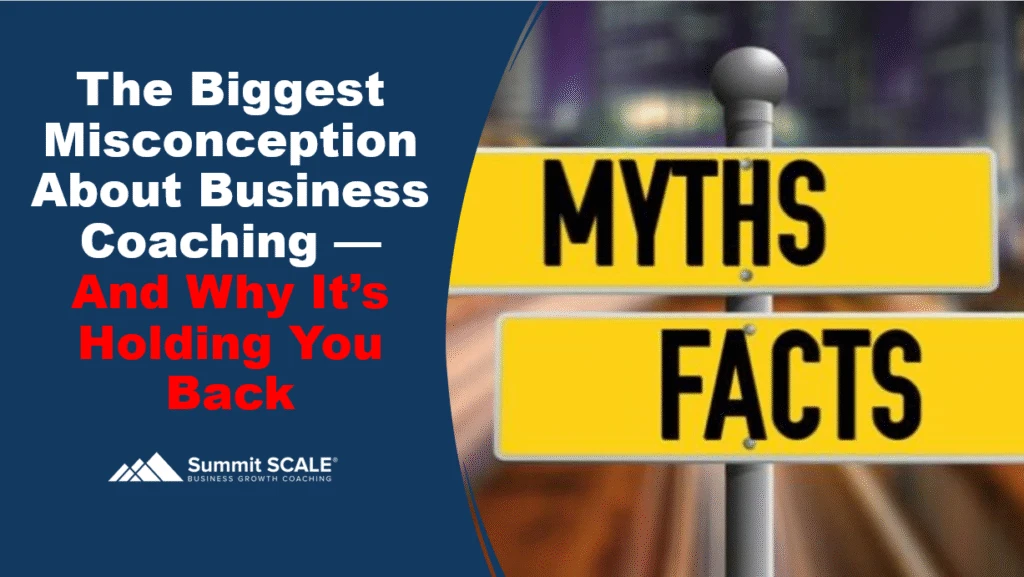
The Biggest Misconception About Business Coaching — And Why It’s Holding You Back
When I tell people I’m a business coach, I often see the same look on their face. They assume I must spend my days with failing businesses, patching up sinking ships, or holding the hands of overwhelmed owners who can’t cope.
And that right there is the biggest misconception about business coaching—the idea that it’s only for businesses in trouble.
Here’s the reality: coaching isn’t a crutch. It’s a catalyst. The owners who get the most out of coaching are usually doing well already. They’ve built something solid. They’re ambitious. And they don’t want to wait until things break before they get support.
Just like elite athletes, they understand that if you want to perform at your best, you don’t wait for injury—you work with a coach to stay sharp, grow stronger, and reach levels you’d never hit on your own.
Why People Get This Wrong
It’s not surprising the myth exists. Coaching is still a young industry, and it often gets muddled with consulting or “fix-it” services. A lot of coaches also market themselves as rescuers of stressed owners, so naturally people think coaching = firefighting.
But that’s not what good coaching is about. Yes, I’ve helped owners steady the ship in a storm—but the real value is in getting ahead of the storm in the first place.
Coaching at Its Best
When coaching works best, it helps business owners:
- See blind spots. We all have them. You can’t spot your own thinking traps when you’re right in the middle of them.
- Cut through the noise. Most owners are pulled in ten directions at once. Coaching helps you stay focused on the few things that really move the needle.
- Build systems. Growth doesn’t come from you working harder—it comes from creating systems that let the business run and scale without you.
- Grow as a leader. A business rarely outgrows its leader. If you want your company to move up, you have to move up too.
- Accelerate progress. I see it all the time: things that would normally take years to figure out get nailed in a few months with the right coaching support.
That’s why so many of the world’s most successful CEOs, entrepreneurs, and high-performing teams invest in coaching. Not because they’re failing, but because they want to win bigger and faster.
Real Examples from My Clients
Let me give you a couple of quick stories.
A few years ago, I worked with the owner of a well-established electrical contracting firm. On the surface, everything looked fine: healthy revenue, solid client base, steady pipeline of projects. But the owner came to me because he felt trapped in the day-to-day. He was on every job site, signing off every invoice, dealing with every complaint. He thought coaching might help him “handle the stress better.”
What he discovered was much bigger. Together, we built systems so the business could run without him needing to be everywhere. We clarified his team’s roles, introduced performance incentives, and freed him up to focus on growth. Within a year, profits were up, the team was thriving, and—most importantly—he had his evenings and weekends back. He didn’t come to me because his business was failing. He came because he wanted to succeed on his own terms.
Another example: a recruitment firm I coached. The owner was talented at winning new clients and had a great team, but margins were thin, and staff turnover was high. She wasn’t failing—she was growing—but growth was messy. We worked on tightening her financial model, improving her own recruitment process, and aligning her team with clear incentives. Within six months, she’d doubled her bottom line and cut staff churn dramatically. Again, this wasn’t about rescuing a failing company. It was about taking a good business and making it great.
I share these stories because they prove the point: coaching is about acceleration, not resuscitation.
What Happens If You Wait Too Long
Sadly, many owners only reach out when they’re already exhausted and the business is under real pressure—cash flow is tight, the team is falling apart, and nothing is working as it should. By that stage, options are more limited.
Think of it like calling a personal trainer only once you’re already in the hospital with health issues. Of course, they can help you recover—but wouldn’t it have been better to start when you had energy and momentum to build on?
Coaching is the same. The earlier you get support, the more leverage you have. You’re not just fixing problems—you’re multiplying what’s already working.
A Mindset Shift
Here’s the shift I’d love more business owners to make:
- Coaching is not a sign of weakness.
- Coaching is a sign of ambition.
When you view it that way, the stigma disappears. It’s no longer “I must be struggling if I need a coach.” It becomes “I’m serious about growth, and I’m not going to leave it to chance.”
Final Thought
The most damaging myth about business coaching is that it’s only for businesses that are failing. And honestly, that belief keeps far too many owners grinding away, trying to do it all themselves, and leaving growth on the table.
The truth? Coaching is a growth tool.
So don’t wait until you’re desperate to get help. If your business is in good shape, that’s the perfect time to invest in coaching. That’s when you can really accelerate and build the business you always imagined.
Because in business, just like in sport, the people who win big aren’t the ones who waited until things went wrong to hire a coach. They’re the ones who got support early and refused to go it alone.
Let’s chat about how business coaching could help you. I invite you to book a complimentary 15-minute call with me here.


